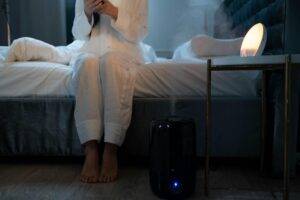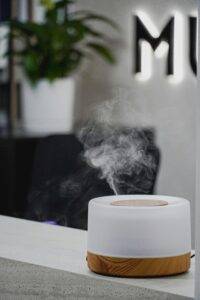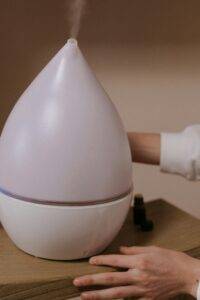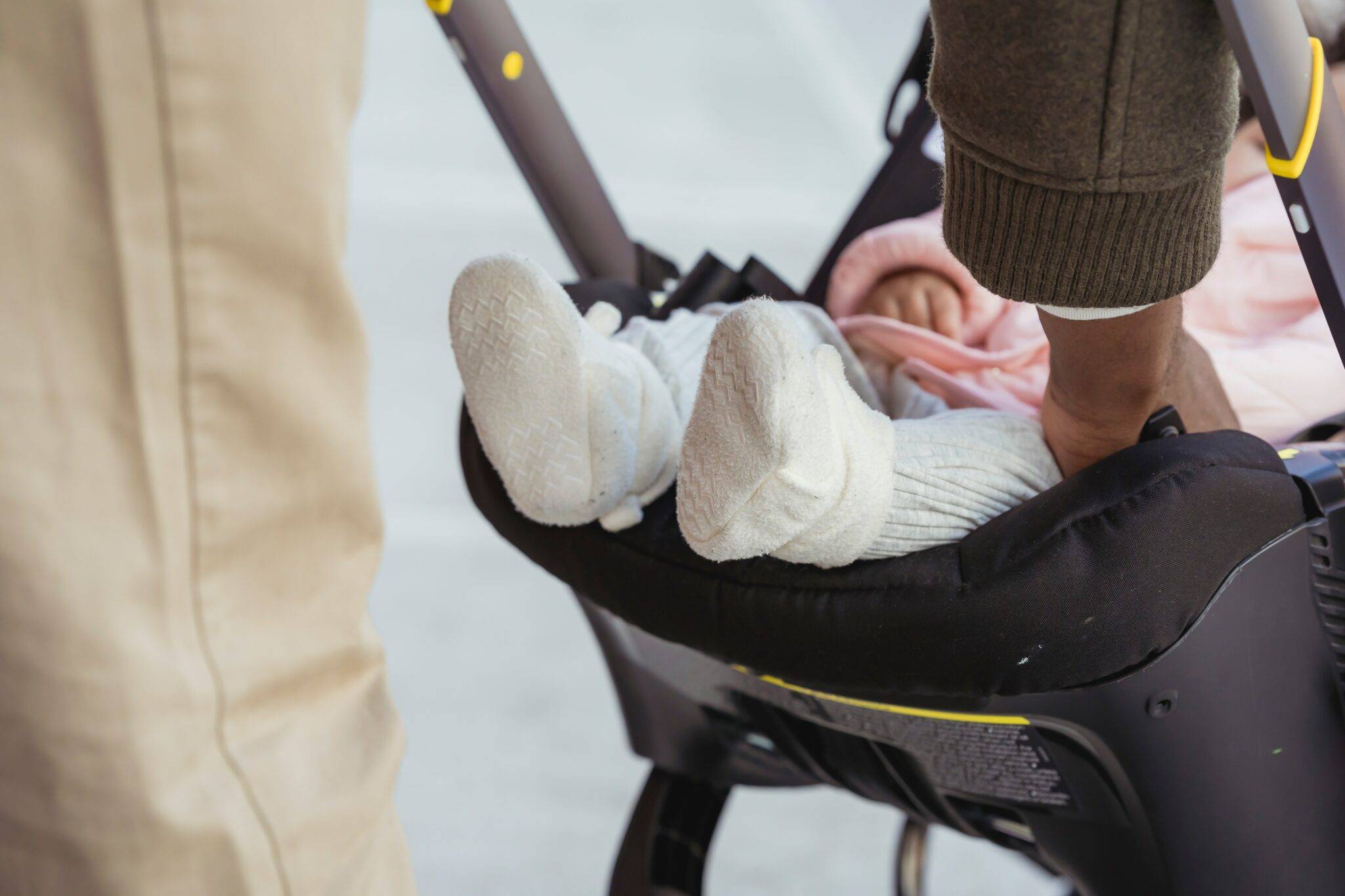Congestion among newborns can be quite worrisome for parents. Seeing your little one struggle with stuffy noses and breathing difficulties is never easy. One effective tool to help alleviate these symptoms is a cool mist humidifier.
This blog post will explore how a cool mist humidifier can help with congestion in newborns and why it’s a must-have for your baby’s nursery.
What Causes Congestion in Newborns?
Newborns experience congestion due to various reasons. Here are some common causes:
- Dry Air: When the air is dry, it can irritate a baby’s nasal passages, leading to congestion.
- Colds and Infections: Common colds, flu, and other respiratory infections can cause mucus buildup.
- Allergies: Dust, pollen, and pet dander can also trigger congestion in babies.
- Environmental Factors: Smoke, strong odors, and pollutants can irritate a baby’s respiratory system.
Symptoms of Congestion in Newborns
Recognizing the signs of congestion in newborns is crucial for timely intervention. Look out for:
- Difficulty breathing through the nose
- Noisy breathing or snoring
- Feeding difficulties due to blocked nasal passages
- Restlessness and difficulty sleeping
How Cool Mist Humidifiers Work
A cool mist humidifier is a device that adds moisture to the air without heating it. It works by using either ultrasonic technology or a fan-and-wick system to disperse a fine mist of water vapor into the room. This added moisture helps maintain an optimal humidity level in your home.
Benefits of Cool Mist Humidifiers

Using a cool mist humidifier offers several benefits, especially for newborns dealing with congestion:
- Moisturizes Dry Air: Adding moisture to the air helps soothe and hydrate dry nasal passages.
- Reduces Mucus Thickness: Humidified air can thin the mucus, making it easier for babies to breathe.
- Prevents Nosebleeds: Keeping the air moist prevents the nasal passages from drying out and bleeding.
- Improves Sleep Quality: By easing breathing difficulties, humidifiers help newborns sleep better.
How Does a Cool Mist Humidifier Help With Congestion?
1. Hydration and Nasal Relief
When a cool mist humidifier is used, the increased humidity in the air helps to keep the nasal passages moist. This moisture prevents the nasal passages from becoming dry and irritated, which can exacerbate congestion.
Keeping these passages hydrated helps reduce the swelling and allows mucus to flow more freely, making it easier for your baby to breathe.
2. Thinning Mucus
Thick mucus clogs nasal passages and makes it difficult for newborns to breathe. The added moisture from the humidifier helps to thin the mucus, making it easier to expel through sneezing or gentle suctioning with a bulb syringe.
3. Reducing Irritants
Humidifiers also help reduce the presence of airborne irritants such as dust and allergens. By adding moisture to the air, these particles become heavier and settle faster, making them less likely to be inhaled by your baby. This is particularly beneficial if your newborn’s congestion is triggered by allergies or environmental factors.
4. Creating a Comfortable Environment
When the air is too dry, it’s harsh on the delicate respiratory system of a newborn. The gentle mist produced by the humidifier adds just the right amount of moisture to the air, creating a soothing and comfortable atmosphere that promotes easier breathing and restful sleep.
Additional Tips for Relieving Congestion in Newborns
- Keep Your Baby Hydrated: Offer frequent feedings, whether breast milk or formula, to help thin the mucus and keep the nasal passages moist.
- Elevate the Head: When your baby is sleeping or resting, slightly elevate the head of the crib or bassinet. This position helps reduce nasal congestion and makes breathing easier. Follow safe sleep guidelines to prevent the risk of SIDS (Sudden Infant Death Syndrome).
- Use Saline Drops: These are a gentle and effective way to relieve nasal congestion. A few drops in each nostril help loosen the mucus, making it easier for your baby to breathe. Always consult with your pediatrician before using any medication or drops.
- Gentle Suction: Using a bulb syringe or nasal aspirator helps remove mucus from your baby’s nose. Be gentle to avoid irritating the delicate nasal passages. Suction only if necessary, as overuse can irritate.
Creating a Healthy Sleep Environment
- Humidity Levels for Comfort: Maintaining optimal humidity levels in your baby’s room is crucial. The ideal humidity level is between 40 and 60%. This range helps keep your baby’s nasal passages moist, which reduces congestion. Use a hygrometer to monitor the humidity levels and adjust the humidifier settings accordingly.
- Consistent Cleaning Routine: This ensures your cool mist humidifier functions effectively and prevents the growth of mold and bacteria. Empty the water tank daily, rinse it out, and let it air dry. Perform a deep clean once a week using a mixture of water and vinegar to remove any mineral deposits and disinfect the unit.
- Placement of the Humidifier: Where you place the humidifier in your baby’s room matters
Position the humidifier at least three feet away from the crib or play area to avoid putting excess moisture directly on your baby. Ensure it’s in a central location in the room to prevent direct exposure to the mist.
Place the humidifier on a stable, flat, and raised surface away from your baby’s reach. It should be directed away from the walls or furniture to prevent dampness and mold growth.
Benefits Beyond Congestion Relief
Skin Health
Newborns have sensitive skin that easily becomes dry and irritated. Dry air leads to dry, itchy skin and exacerbates conditions like eczema. Adding moisture to the air helps keep your baby’s skin hydrated and healthy. Humidified air helps keep their skin hydrated, reducing the risk of dryness and irritation.
Comfort During the Cold and Flu Season
Dry air can dry out the mucous membranes in the respiratory tract, making it easier for viruses and bacteria to enter the body. Proper humidity levels help keep these membranes moist and more effective at trapping and expelling pathogens.
During the colder months, indoor heating systems make the air very dry, leading to discomfort and an increased risk of respiratory infections. A cool mist humidifier helps. maintain a comfortable humidity level, making it easier for your baby to breathe and reducing the chances of catching colds and flu.
Better Sleep for the Whole Family
Maintaining an optimal humidity level in the nursery promotes better sleep for your baby. Humidified air prevents nasal passages from drying out and reduces the likelihood of your baby waking up due to discomfort from congestion or a dry throat.
A well-rested baby means well-rested parents. When your baby sleeps comfortably without the discomfort of congestion, the whole family benefits. A cool mist humidifier contributes to a more restful night’s sleep for everyone in the household.
Reducing Static Electricity
Humidifiers reduce static electricity in the air, which is especially common in dry indoor environments. This makes your home more comfortable and safe for your baby.
Common Concerns and Misconceptions
- Safety Concerns: Some parents worry about the safety of using a humidifier in their baby’s room. Modern cool mist humidifiers are designed with safety features such as automatic shut-off when the water level is low. Additionally, unlike warm mist humidifiers, they don’t pose a burn risk since they do not use boiling water.
- Over-Humidification: While adding moisture to the air is beneficial, too much humidity creates a breeding ground for mold and dust mites. Monitor the humidity levels in your baby’s room and keep them within the recommended range. Using a hygrometer helps you maintain the right balance.
- Maintenance Hassles: Regular maintenance of a humidifier might seem like a hassle, but it’s necessary to ensure the device works effectively and safely. Investing in a model that’s easy to clean simplifies this task. Regular cleaning prevents the buildup of mold and bacteria, ensuring your baby breathes clean, moist air.
Choosing the Right Cool Mist Humidifier
Features to Look For
When selecting a cool mist humidifier for your newborn’s nursery, consider the following features:
- Quiet Operation: Look for a humidifier with quiet operation to ensure it doesn’t disturb your baby’s sleep.
- Adjustable Mist Settings: Adjustable settings allow you to control the amount of moisture in the air.
- Easy to Clean: Choose a model that’s easy to disassemble and clean to prevent mold and bacteria buildup.
- Automatic Shut-Off: This feature ensures the humidifier turns off when the water level is low, enhancing safety.
Maintenance Tips
Proper maintenance of your cool mist humidifier is essential to ensuring it functions effectively and safely.
- Regular Cleaning: Clean the humidifier regularly to prevent mold and bacteria growth.
- Use Distilled Water: Using distilled water reduces the buildup of mineral deposits.
- Change Filters: If your humidifier has a filter, replace it as recommended by the manufacturer.
- Monitor Humidity Levels: Use a hygrometer to monitor and maintain optimal humidity levels (around 40–60%).
Alternatives and Complementary Solutions
- Steam Inhalation: In addition to using a cool mist humidifier, steam inhalation provides temporary relief for your baby’s congestion. Sitting in a steamy bathroom with your baby for a few minutes helps loosen mucus. However, always stay in the room and supervise your baby closely during this process.
- Using a Vaporizer: A vaporizer is another device that adds moisture to the air. Unlike humidifiers, vaporizers use heat to produce steam. While effective, they pose a burn risk and should be used with caution around children. Cool mist humidifiers are generally safer for newborns.
- Air Purifiers: If your baby’s congestion is triggered by allergens, an air purifier helps remove dust, pollen, and other irritants from the air. Combining an air purifier with a cool mist humidifier creates a cleaner and more comfortable environment for your baby.
Comparing Cool Mist Humidifiers to Other Types
Cool Mist vs. Warm Mist Humidifiers

While both cool mist and warm mist humidifiers add moisture to the air, they work differently and have distinct advantages:
- Cool Mist Humidifiers: These are safer for use around children and pets since they don’t use heat. They’re energy-efficient and ideal for larger spaces. Cool mist humidifiers help soothe nasal passages and thin mucus, making them particularly effective for relieving congestion.
- Warm Mist Humidifiers: These use heating elements to boil water and release steam. They’re slightly more effective at killing bacteria and mold in the water, but they consume more energy and pose a burn risk if touched. Warm mist humidifiers are often quieter and help ease respiratory discomfort by providing warm, moist air.
Cool Mist Humidifiers vs. Vaporizers
Vaporizers and humidifiers both add moisture to the air but in different ways:
- Vaporizers: These devices heat water to create steam, which is then cooled slightly before being released into the air. Vaporizers can also be used with medicated inhalants to help relieve coughing and congestion.
- Cool Mist Humidifiers: These don’t heat the water, making them safer for children’s rooms. These use ultrasonic technology or a fan-and-wick system to create a cool mist. Cool mist humidifiers are more energy-efficient and suitable for year-round use.
When to See a Doctor
While a cool mist humidifier greatly helps with congestion, there are times when you should seek medical advice. Contact your pediatrician if your baby:
- Has a high fever
- Shows signs of dehydration
- Experiences difficulty breathing or rapid breathing
- Has persistent congestion lasting more than a week
- Exhibits signs of a more serious illness, such as an ear infection or bronchiolitis
Get a Cool Mist Humidifier for Your Baby’s Room
A cool mist humidifier can be a lifesaver for newborns dealing with congestion. Adding much-needed moisture to the air helps to hydrate nasal passages, making your baby comfortable. Combined with other supportive measures, a cool mist humidifier significantly eases your baby’s discomfort and promotes better sleep.
For more information on how to care for your newborn, check out these helpful articles on Omega Pediatrics and Omega Pediatrics.
- Newborn Baby is Red: 5 Ways to Soothe and Make Them Comfortable
- Helpful Tips to Put Your Newborn Baby to Sleep So You Can Get Some Rest Too
Always consult with your pediatrician for personalized advice and guidance on managing your baby’s health. A cool mist humidifier, when used correctly, can be an effective tool in your arsenal to ensure your baby’s comfort and well-being during those early months.






